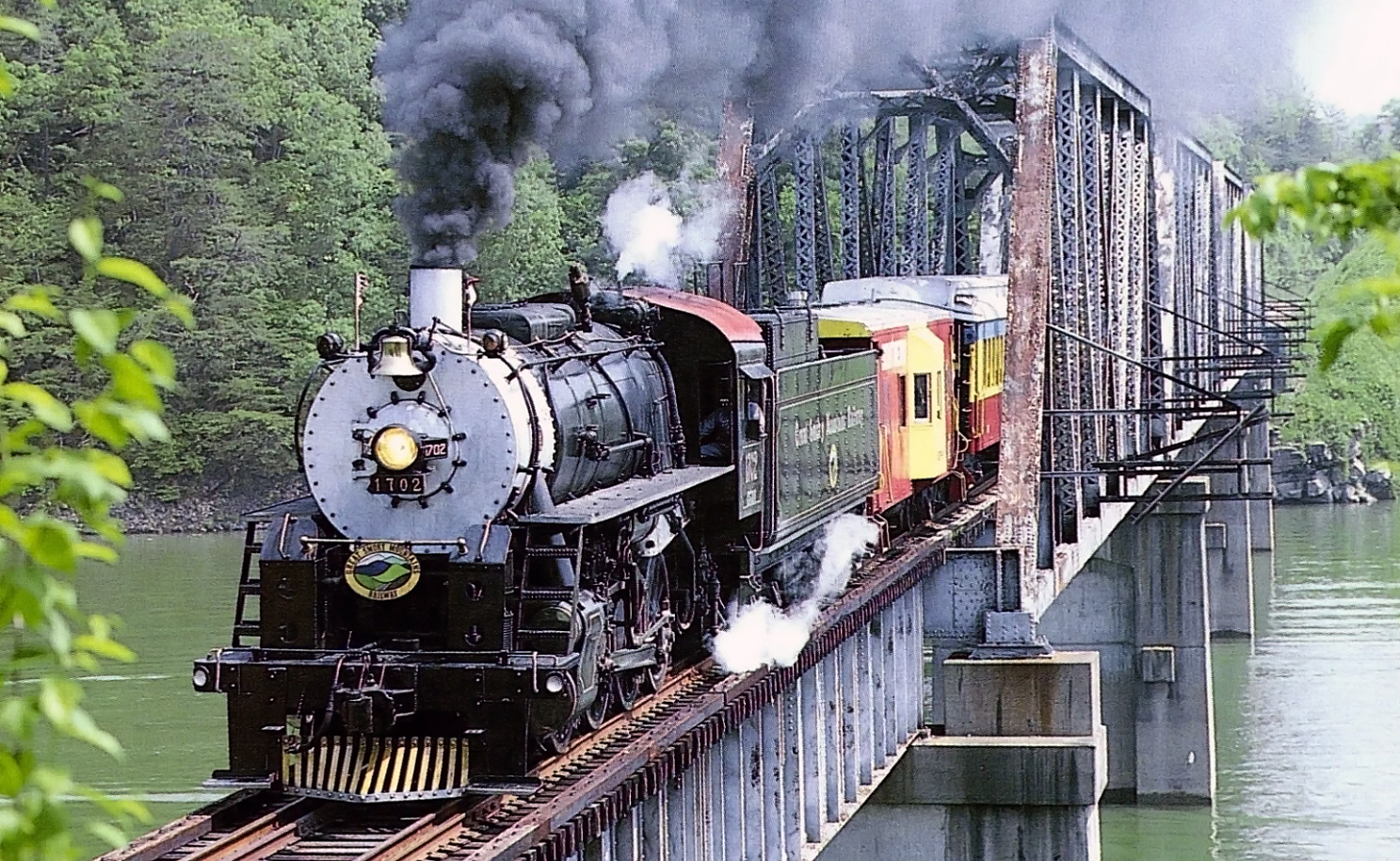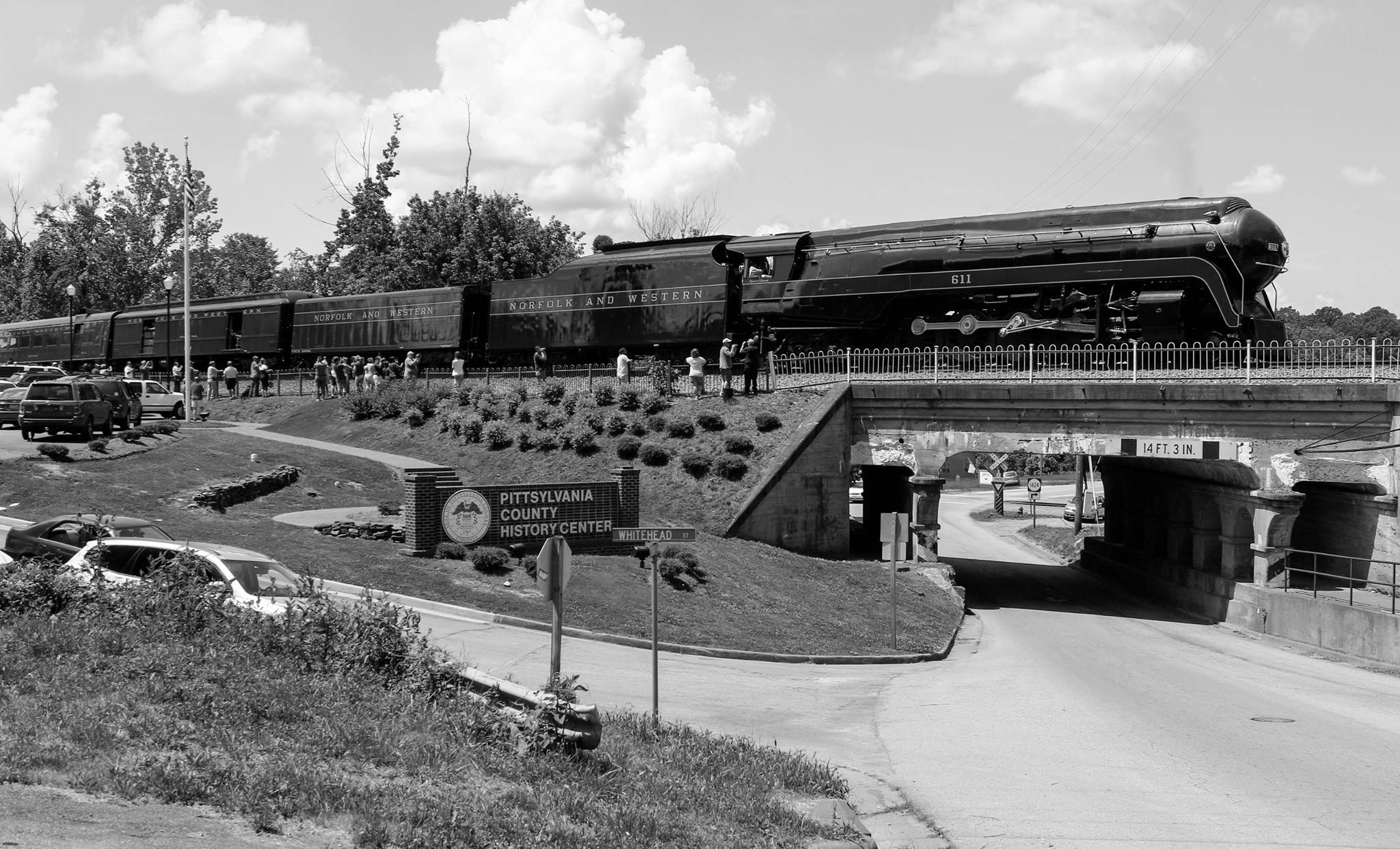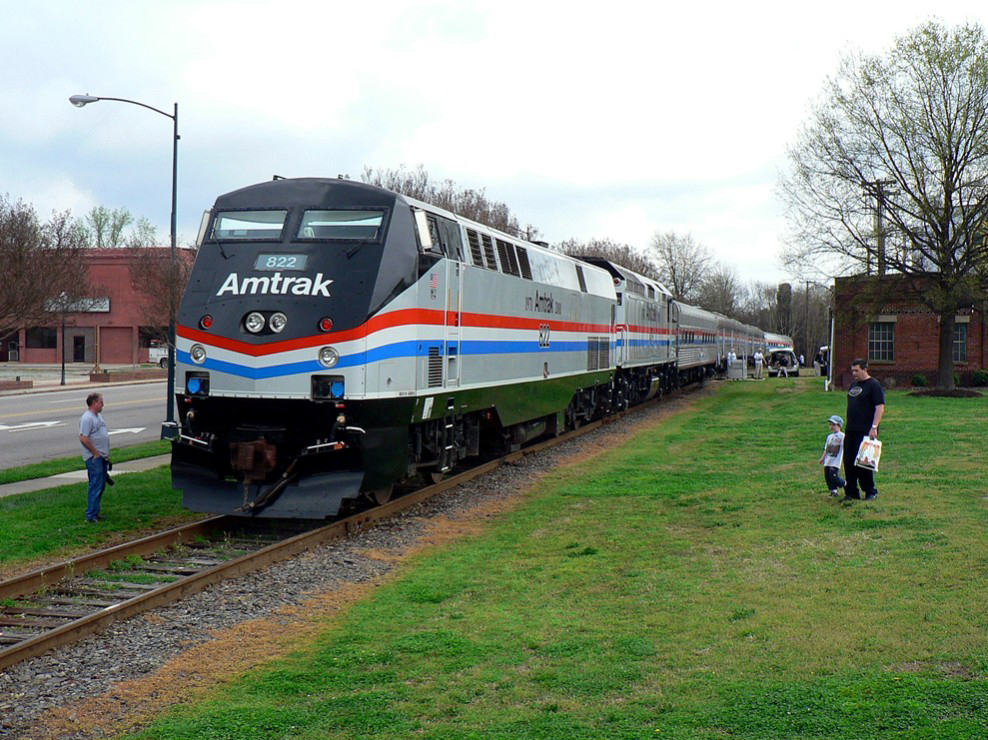North Carolina Scenic Train Rides: A Complete Guide
Published: February 25, 2025
By: Adam Burns
North Carolina scenic train rides have a lot to offer even though the state is not traditionally known for such attractions. Two of the country's more well-known operations are located there, the Great Smoky Mountains Railroad at Bryson City and Tweetsie Railroad in Blowing Rock.
Their success can be largely attributed to two things; the beautiful and majestic Smoky Mountains, a region which enjoys more than 10 million visitors annually, and steam locomotives.
Both railroads utilize such and they always draw large crowds. In addition, don't miss the North Carolina Transportation Museum in Spencer (which occasionally operates Bonsal Sand 0-6-0T #7 and displays several other steamers) and the New Hope Valley Railway at Bonsal (about 25 miles southwest of Raleigh). Finally, catch a trolley ride at Charlotte Trolley, which operates historic equipment for visitors and tourists (you can also ride the city's new "Lynx" light rail transit system).
 Great Smoky Mountains Railroad 2-8-0 #1702 leads an excursion over the Fontana Lake Bridge along the Southern's former Murphy Branch on June 7, 1992. Jim Wrinn photo.
Great Smoky Mountains Railroad 2-8-0 #1702 leads an excursion over the Fontana Lake Bridge along the Southern's former Murphy Branch on June 7, 1992. Jim Wrinn photo.State Rail History
North Carolina's railroad heritage begins in 1834 when the Wilmington & Raleigh Railroad (W&R;) was chartered by Wilmington's business elite to connect its namesake cities.
The year began with apprehension and disappointment when the state legislature declined a bond for the project in January. However, after promoters dropped this provision and instead moved towards a charter, the state gave the go-ahead.
Another issue cropped up when the citizens of Raleigh did not want the railroad accessing their town. To rectify this, officials decided to bypass the capital and reach Weldon where an interchange could be established with the Richmond & Petersburg. Construction of the W&R; began in October, 1836 and was completed only a few years later on March 7, 1840.
At a distance of 161.5 miles, it was then the world's longest railroad, even eclipsing the South Carolina Canal & Rail Road which had opened a 136-mile corridor between Charleston and Hamburg, South Carolina (directly across the Savannah River from Augusta) in October, 1833. In 1855 the W&R;'s name was changed to the Wilmington & Weldon (W&W;) to more accurately reflect the railroad's termini.
The W&W would go on to join the Atlantic Coast Line Railroad, formed in 1900 through the merger of several smaller systems. There were five primary components of the original ACL.
Its earliest predecessor was the Petersburg Railroad, chartered in 1830. It opened for service a few years later between its home city and Garysburg, North Carolina, just across the Roanoke River from Weldon. At Petersburg, a connection was established with the Richmond & Petersburg, completed between its namesake cities in 1838.
Together, the two roads provided a direct route from Richmond to the Tarheel State. As the 1840s dawned more connections from the south extended through service into South Carolina and beyond, such as the previously mentioned Wilmington & Weldon.
During the industry's heyday, North Carolina boasted a wide range of railroading, from local short lines to coal trains in the western mountains (notably the Clinchfield Railroad). In addition, coastal operations could be found on the original Norfolk Southern at Elizabeth City and the ACL serving Wilmington.
While all of the state's railroad attractions are worth the visit, the Great Smoky Mountains Railroad is a must see. It not only offers great scenery but guests also have the option of several different excursion packages, all in climate-controlled cars.
 Freshly restored Norfolk & Western 4-8-4 #611 departs the North Carolina Transportation Museum in Spencer during May of 2015. Dan Robie photo.
Freshly restored Norfolk & Western 4-8-4 #611 departs the North Carolina Transportation Museum in Spencer during May of 2015. Dan Robie photo.Charlotte Trolley
One of the more unique scenic train rides in North Carolina can be found at the Charlotte Trolley which tells the history of Charlotte's former interurban operations. The trolley operates on the weekend, Saturday and Sunday, and current has two cars operational.
Great Smoky Mountains Railroad
Without question, the most popular of all North Carolina train rides can be found at the Great Smoky Mountain Railroad in Bryson City.
This attraction has been in operation since 1988 using tracks once owned by the venerable Southern Railway, which the company called its Murphy Branch. Train rides are hosted throughout much of the year although they also offer special events, such as "Thomas The Train" and holiday festivities.
New Hope Valley Railway
The New Hope Valley Railway, based in New Hill, hosts North Carolina train rides on trackage originally built by the New Hope Valley Railroad, which later part of the Seaboard Air Line system. They currently have a multitude of various diesel locomotive switchers they use to power their trains along with one operable 0-4-0T steam locomotive.
North Carolina Transportation Museum
The one place in the Tarheel State where both scenic train rides and a fabulous collection of preserved equipment can be experienced is at the North Carolina Transportation Museum. It is located in Spencer, situated on the former Southern Railway’s largest steam locomotive repair shops.
Today the museum sees tens of thousands annually and is housed in three of the former shop buildings (currently); the Bob Julian Roundhouse, the Flue Shop, and the Master Mechanics Shop.
As part of the museum they operate excursion trains on the museum grounds and is one of just two locations in the United States to feature the live steam locomotive version of Thomas the tank engine.
 Amtrak's "Exhibit Train" is seen here on display at the North Carolina Transportation Museum in the spring of 2012. Dan Robie photo.
Amtrak's "Exhibit Train" is seen here on display at the North Carolina Transportation Museum in the spring of 2012. Dan Robie photo.Tweetsie Railroad
The Tweetsie Railroad, based in Blowing Rock, North Carolina has been operating since 1957 and utilizes a section of the historic East Tennessee & Western North Carolina Railroad (nicknamed the "Tweetsie," this classic narrow-gauge system once served both its namesake states).
If there are two North Carolina scenic train rides you should experience it is the Tweetsie and Great Smoky Mountains Railroad. Today, they use 3 miles of track to host trips, most often employing their, 4-6-0 "Ten wheeler", #12, to pull excursions.
Recent Articles
-
Nevada Museum Acquires Amtrak F40PHR 315
Mar 02, 26 10:32 PM
The Nevada State Railroad Museum has stated they have acquired Amtrak F40PHR 315 from Western Rail, Inc. where it will be used for static display. -
Virginia Railway Express Surpasses 100 Million Riders
Mar 02, 26 09:42 PM
In October 2025, the Virginia Railway Express (VRE) reached one of the most significant milestones in its history, officially carrying its 100 millionth passenger since beginning operations more than… -
Restoration Continues On New Haven RS3 529
Mar 02, 26 11:29 AM
The Railroad Museum of New England's efforts to completely restore New Haven RS3 529 to operating condition as they provide the latest updates on the project. -
American Freedom Train No. 250 Completes FRA Steam Test
Mar 02, 26 10:17 AM
One of the most anticipated steam locomotive restorations in modern preservation reached a major milestone this week as American Freedom Train 4-8-4 No. 250 successfully completed a federally observed… -
Indiana's Beer Tasting Train Rides
Mar 02, 26 10:00 AM
On select dates, the French Lick Scenic Railway adds a social twist with its popular Beer Tasting Train—a 21+ evening built around craft pours, rail ambience, and views you can’t get from the highway. -
Maryland's Whiskey Tasting Train Rides
Mar 02, 26 09:54 AM
You can enjoy whiskey tasting by train at just one location in Maryland, the popular Western Maryland Scenic Railroad based in Cumberland. -
California's Whiskey Tasting Train Rides
Mar 02, 26 09:46 AM
There is currently just one location in California offering whiskey tasting by train, the famous Skunk Train in Fort Bragg. -
Virginia Murder Mystery Dinner Train Rides
Mar 02, 26 09:42 AM
Among the state's railroad attractions, murder mystery dinner trains stand out as a captivating fusion of theatrical entertainment, fine dining, and scenic travel. -
New York Wine Tasting Train Rides
Mar 02, 26 09:32 AM
This article will delve into the history, offerings, and appeal of wine tasting trains in New York, guiding you through a unique experience that combines the romance of the rails with the sophisticati… -
Michigan Wine Tasting Train Rides
Mar 02, 26 09:30 AM
In this article, we’ll delve into the world of Michigan’s wine tasting train experiences that cater to both wine connoisseurs and railway aficionados. -
NS Completes 1,000th DC-to-AC Locomotive Conversion
Mar 01, 26 11:26 PM
In October 2025, Norfolk Southern Railway reached one of the most significant mechanical milestones in modern North American railroading, announcing completion of its 1,000th DC-to-AC locomotive conve… -
California Easter Train Rides
Mar 01, 26 10:11 AM
California is home to many tourist railroads and museums; several offer Easter-themed train rides for the entire family. -
North Carolina Easter Train Rides
Mar 01, 26 10:09 AM
The springs are typically warm and balmy in the Tarheel State and a few tourist trains here offer Easter-themed train rides. -
Maryland Murder Mystery Dinner Train Rides
Mar 01, 26 10:05 AM
Maryland is known for its scenic landscapes, historical landmarks, and vibrant culture, but did you know that it’s also home to some of the most thrilling murder mystery dinner trains? -
Minnesota Murder Mystery Dinner Train Rides
Mar 01, 26 10:03 AM
Murder mystery dinner trains offer an enticing blend of suspense, culinary delight, and perpetual motion, where passengers become both detectives and dining companions on an unforgettable journey. -
Indiana Wine Tasting Train Rides
Mar 01, 26 10:01 AM
In this article, we'll delve into the experience of wine tasting trains in Indiana, exploring their routes, services, and the rising popularity of this unique adventure. -
South Dakota Wine Tasting Train Rides
Mar 01, 26 09:58 AM
For wine enthusiasts and adventurers alike, South Dakota introduces a novel way to experience its local viticulture: wine tasting aboard the Black Hills Central Railroad. -
Metro-North Unveils Veterans Heritage Locomotive
Feb 28, 26 11:02 PM
The Metro-North Railroad marked Veterans Day 2025 with the unveiling of a striking new heritage locomotive honoring the service and sacrifice of America’s military veterans. -
Pennsylvania's Whiskey Tasting Train Rides
Feb 28, 26 08:46 AM
For whiskey aficionados and history buffs alike, a train ride through the Keystone State offering such spirits provides a unique and memorable experience. -
Alabama's Whiskey Tasting Train Rides
Feb 28, 26 08:44 AM
With a little planning, you can build a memorable whiskey-and-rails getaway in the Heart of Dixie. -
Georgia Murder Mystery Dinner Train Rides
Feb 28, 26 08:43 AM
In the heart of the Peach State, a unique form of entertainment combines the thrill of a murder mystery with the charm of a historic train ride. -
Colorado Murder Mystery Dinner Train Rides
Feb 28, 26 08:40 AM
Nestled among the breathtaking vistas and rugged terrains of Colorado lies a unique fusion of theater, gastronomy, and travel—a murder mystery dinner train ride. -
New Mexico Wine Tasting Train Rides
Feb 28, 26 08:37 AM
For oenophiles and adventure seekers alike, wine tasting train rides in New Mexico provide a unique opportunity to explore the region's vineyards in comfort and style. -
Ohio Wine Tasting Train Rides
Feb 28, 26 08:35 AM
Among the intriguing ways to experience Ohio's splendor is aboard the wine tasting trains that journey through some of Ohio's most picturesque vineyards and wineries. -
KC Streetcar Ridership Surges With Opening of Main Street Extension
Feb 27, 26 11:24 AM
Kansas City’s investment in modern urban rail transit is already paying dividends, especially following the opening of the Main Street Extension. -
“Auburn Road Special” Excursions To Aid URHS
Feb 27, 26 09:04 AM
The United Railroad Historical Society of New Jersey (URHS) and the Finger Lakes Railway have jointly announced a special series of rare-mileage passenger excursions scheduled for April 18–19, 2026. -
New Jersey Easter Train Rides
Feb 27, 26 08:53 AM
New Jersey is home to several museums and a few heritage railroads that vividly illustrate its long history with the iron horse. A few host special events for the Easter holiday. -
Washington Easter Train Rides
Feb 27, 26 08:49 AM
You can find many heritage railroads in Washington State which illustrates its rich history with the iron horse. A few host Easter-themed events each spring. -
South Dakota Murder Mystery Dinner Train Rides
Feb 27, 26 08:46 AM
While the state currently does not offer any murder mystery dinner train rides, the popular 1880 Train at the Black Hills Central recently hosted these popular trips! -
Wisconsin Murder Mystery Dinner Train Rides
Feb 27, 26 08:42 AM
Whether you're a fan of mystery novels or simply relish a night of theatrical entertainment, Wisconsin's murder mystery dinner trains promise an unforgettable adventure. -
Pennsylvania Wine Tasting Train Rides
Feb 27, 26 08:38 AM
Wine tasting trains are a unique and enchanting way to explore the state’s burgeoning wine scene while enjoying a leisurely ride through picturesque landscapes. -
West Virginia Wine Tasting Train Rides
Feb 27, 26 08:37 AM
West Virginia, often celebrated for its breathtaking landscapes and rich history, offers visitors a unique way to explore its rolling hills and picturesque vineyards: wine tasting trains. -
Nebraska Lawmakers Advance UP Tax Incentive Bill
Feb 27, 26 08:31 AM
Nebraska lawmakers are advancing new economic development legislation designed in large part to ensure that Union Pacific Railroad maintains its historic corporate headquarters in Omaha. -
UP And NS Ask FRA To Waive Cab-Signals For Big Boy 4014
Feb 26, 26 01:44 PM
Union Pacific’s famed 4-8-8-4 “Big Boy” No. 4014 could see new eastern mileage on Norfolk Southern in 2026—but first, the two railroads are asking federal regulators for help bridging a technology gap… -
Cando Rail & Terminals to Acquire Savage Rail
Feb 26, 26 11:29 AM
Cando Rail & Terminals has signed a definitive agreement to acquire Savage Rail, the U.S. rail-services business of Savage Enterprises LLC. -
Dollywood To Convert Steam Locomotives From Coal To Oil
Feb 26, 26 09:20 AM
Dollywood’s most recognizable moving landmark—the Dollywood Express—will soon look and feel a little different. -
Missouri Murder Mystery Dinner Train Rides
Feb 26, 26 09:10 AM
Missouri, with its rich history and scenic landscapes, is home to one location hosting these unique excursion experiences. -
Washington Murder Mystery Dinner Train Rides
Feb 26, 26 09:08 AM
This article delves into what makes murder mystery dinner train rides in Washington State such a captivating experience. -
Utah Wine Tasting Train Rides
Feb 26, 26 09:04 AM
Utah, a state widely celebrated for its breathtaking natural beauty and dramatic landscapes, is also gaining recognition for an unexpected yet delightful experience: wine tasting trains. -
Vermont Wine Tasting Train Rides
Feb 26, 26 09:02 AM
Known for its stunning green mountains, charming small towns, and burgeoning wine industry, Vermont offers a unique experience that seamlessly blends all these elements: wine tasting train rides. -
Amtrak San Joaquins Becomes Gold Runner
Feb 26, 26 08:59 AM
California’s busy state-supported rail link between the Bay Area and the Central Valley entered a new chapter in early November 2025, when the familiar Amtrak San Joaquins name was officially retired. -
Canadian National Marks 30 Years Since Privatization
Feb 25, 26 02:07 PM
Canadian National Railway marked a milestone last fall that helped redefine not only the company, but the modern Canadian freight-rail landscape: 30 years since CN went private. -
Western Rail Coalition: Returning Passenger Trains To Colorado
Feb 25, 26 11:48 AM
Colorado’s passenger-rail conversation is often framed as two separate stories: a Front Range “spine” along I-25, and a harder, longer-term quest to offer real alternatives to the I-70 mountain drive. -
Union Pacific Unveils Full Schedule For Big Boy 4014
Feb 25, 26 09:24 AM
Union Pacific Railroad has released the complete western leg schedule for its groundbreaking 2026 Big Boy No. 4014 Coast-to-Coast Tour. -
Kentucky Murder Mystery Dinner Train Rides
Feb 25, 26 08:55 AM
In the realm of unique travel experiences, Kentucky offers an enchanting twist that entices both locals and tourists alike: murder mystery dinner train rides. -
Utah Murder Mystery Dinner Train Rides
Feb 25, 26 08:53 AM
This article highlights the murder mystery dinner trains currently avaliable in the state of Utah! -
Rhode Island Wine Tasting Train Rides
Feb 25, 26 08:50 AM
It may the smallest state but Rhode Island is home to a unique and upscale train excursion offering wide aboard their trips, the Newport & Narragansett Bay Railroad. -
Oregon Wine Tasting Train Rides
Feb 25, 26 08:45 AM
For those looking to explore this wine paradise in style and comfort, Oregon's wine tasting trains offer a unique and enjoyable way to experience the region's offerings. -
Amtrak Posts Record Ridership and Revenue in Fiscal Year 2025
Feb 24, 26 11:22 PM
Amtrak, the national passenger rail operator, has announced historic results for Fiscal Year 2025 (FY25), reporting the highest ridership and revenue in its history as demand for train travel across t… -
NC By Train Posts Busiest Month In 35-year History
Feb 24, 26 06:17 PM
North Carolina’s state-supported passenger rail service, marketed under the NC By Train brand, reached a milestone last fall.


















































